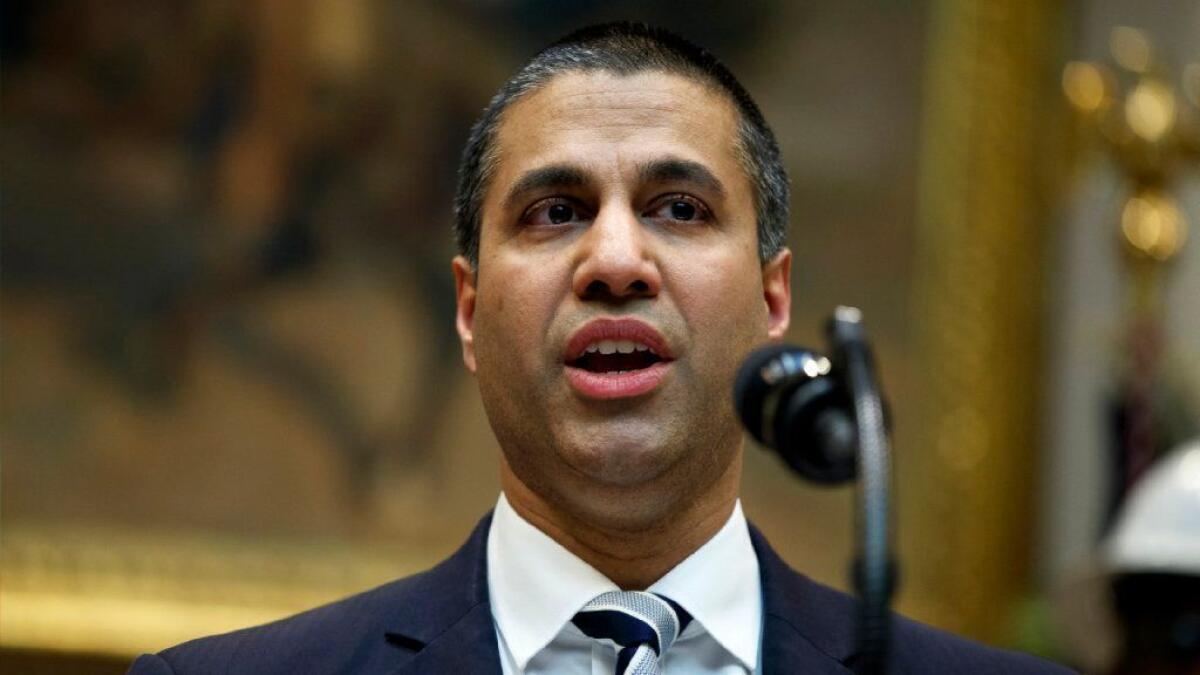T-Mobile and Sprint finally found FCC Chairman Ajit Pai’s price

The way to Ajit Pai’s heart, apparently, is through rural broadband.
The Federal Communications Commission chairman, an eager deregulator who leads the panel’s Republican majority, announced Monday morning that T-Mobile and Sprint have promised even greater public benefits if their merger is allowed to proceed. Those steps were enough to satisfy Pai, which probably means the merger won’t be blocked by the FCC — the commission’s Republicans have moved in sync with Pai.
“Two of the FCC’s top priorities are closing the digital divide in rural America and advancing United States leadership in 5G, the next generation of wireless connectivity,” Pai said. “The commitments made today by T-Mobile and Sprint would substantially advance each of these critical objectives.”
One of Pai’s priorities as chairman has been to increase the availability of broadband in rural areas, such as sparsely populated Parsons, Kan., where he grew up. T-Mobile and Sprint have promised to extend 5G service to 85% of the population of rural America within three years, and 90% within six years.
Enter the Fray: First takes on the news of the minute »
Such promises aside, it was hard to imagine Pai not saying yes to this merger. Although Republicans have led some of the country’s most important antitrust fights — the Reagan administration’s Department of Justice broke up Ma Bell, for example — GOP administrations have tended to look the other way when industries consolidate.
And that’s problematic. Letting T-Mobile absorb Sprint would reduce the number of national network builders from four to three, and when that sort of shrinkage has happened in other countries, it has led to higher prices and less innovation. The companies, which have promised not to raise prices for three years, argue that the merger will enable them to upgrade to 5G faster, but that’s the sort of assertion that merger-seekers always make. It was, in fact, what would-be merger partners AT&T and T-Mobile asserted eight years ago, when the next-generation-network-du-jour was 4G. The merger was denied, and here we are with four robust 4G networks instead of three.
The FCC has to consider concerns about prices and innovation in deciding whether to allow companies to consolidate their spectrum licenses, but its review is broader. Its duty is to determine whether a merger or acquisition advances the public interest. That’s why companies try to ease qualms about the reduction in competition by promising to deliver more and better service — and even to compete in markets other than their own. Here, for instance, T-Mobile and Sprint “have offered specific commitments regarding the rollout of an in-home broadband product, including to rural households,” Pai said.
Ahh, the prospect of real competition in residential broadband — something that’s been sorely lacking. Pai hasn’t paid much, if any, attention to that issue thus far, being far more concerned with the utter lack of broadband access in many sparsely populated communities. But promises of this sort of competition have induced the FCC to approve a number of telecom mergers and acquisitions in the past, only to have the newly merged companies all but ignore their commitments.
That’s another strike. “The companies have made a handful of promises on 5G, rural buildout and in-home broadband that are speculative, not specific to the merger and completely unenforceable,” former FCC official Gigi Sohn, who opposes the T-Mobile-Sprint merger, said in a statement Monday morning. “Does anyone really believe that this FCC, which has asked nothing of the big mobile companies for over two years, will require the companies to abide by these commitments?”
(Pai said T-Mobile and Sprint would be penalized billions of dollars if they didn’t live up to their promises, which would “create a powerful incentive for the companies to meet their commitments on time.” How reassuring.)
Even if the FCC does bless the merger, the deal still has to be approved by the Justice Department, whose top antitrust lawyer, Makan Delrahim, does not consider promises like the ones T-Mobile and Sprint are making to be adequate protections against harm. He prefers structural remedies, such as requiring companies to sell assets to third parties that could then compete with the merged entity.
T-Mobile and Sprint have offered some structural fixes as well, such as selling off one of the prepaid wireless plans they own. Another possibility is selling some of their spectrum holdings. But that raises the question whether any deep-pocketed companies want to get into the mobile business just as it’s shrinking from four big players to three.
If your answer to that question is Comcast or Charter, well, you’d be pinning your hopes on companies that would rather resell someone else’s service than build their own — and that have been loath to compete with anyone outside their regional cable footprints.
More to Read
A cure for the common opinion
Get thought-provoking perspectives with our weekly newsletter.
You may occasionally receive promotional content from the Los Angeles Times.







